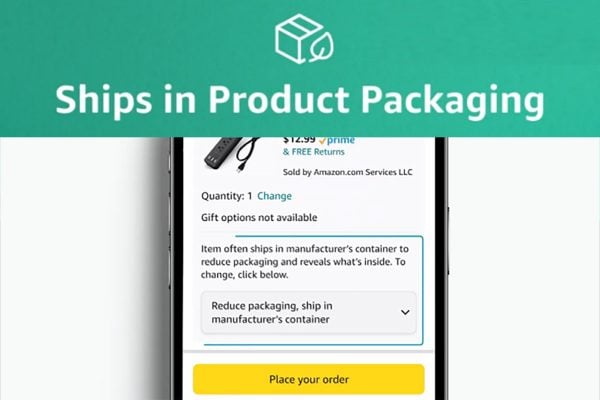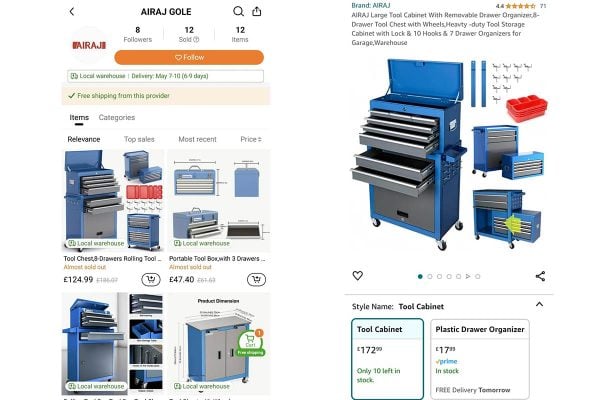 This is a guest post by Eddie Latham, Co-founder and Director of Velocity Commerce, discussing sustainability in ecommerce, particularly focusing on packaging and deliveries but also how the product itself or the way you sell and bundle products can reduce your impact on the environment:
This is a guest post by Eddie Latham, Co-founder and Director of Velocity Commerce, discussing sustainability in ecommerce, particularly focusing on packaging and deliveries but also how the product itself or the way you sell and bundle products can reduce your impact on the environment:
This week it was revealed that UK households are buying 54 ‘bags for life’ a year. This is a really shocking statistic, and leads to many questions about the environmental impact of the retail industry – not just in bricks and mortar stores, but in the ecommerce industry too. Increasing focus on the climate is going to mean that more and more consumers will become conscious about their purchasing habits; therefore the pressure to be as sustainable as possible is only going to increase. In the coming weeks, months and years, brands and online retailers need to invest in improving the sustainability of their operations – to keep your customer-base happy, you need to ensure your planet is looked after too.
The ecommerce industry is now being challenged to transform its operations to become more environmentally friendly, and packaging and transport are two key areas where online retailers are particularly under pressure to reduce their environmental impact.
The big online marketplaces have been leading the change, making announcements of new ways they will be going greener, with Amazon in particular placing a focus on sustainable packaging. This includes the recent introduction of changes to its ‘frustration free packaging’ (FFP) standard, meaning that all items stored and distributed via Amazon’s fulfilment centres, and larger than 45 cm x 35 cm x 20 cm or exceeding 9 kg, must comply to Amazon’s FFP standard. When packaging meets Amazon’s FFP standard, products can be shipped in their original packaging, eliminating the need for an additional Amazon-overbox. The initiative is intended to reduce waste, save costs and deliver customers easy-to-open, 100% recyclable packaging.
While it is a welcome move that Amazon is making efforts to ensure vendors are minimising their packaging, the programme is not without its challenges. For many Amazon sellers, becoming FFP certified means a complete overhaul of their packaging design. Items need to be ready to withstand the rollercoaster ride that is the delivery process – boxes need to be water-proof, they need to endure a drop test, they need to be resilient to being thrown around.
For retailers only selling items via Amazon, it makes sense to ensure the packaging is FFP ready. However, for retailers adopting the bricks and clicks model, also retailing in a physical store, investing in an entire packaging overhaul to meet the FFP standards may not be viable. Retailers would be over-packaging their products for the purpose of in-store retail, and will need to make the choice of whether to invest in different packaging for different purposes, or risk defeating the original objective of reducing waste by over-packaging. With the current environmental sentiment, the former may be the only way to go.
In addition to the pressure around packaging, transport, and the emissions of the delivery process, is another big challenge that online retailers are facing. The way consumers are responding to the increased delivery capabilities of Amazon through services like Prime, means there has been a shift in the way consumers buy. Bulk orders are decreasing in popularity and consumers are now much more likely to receive a separate order from a separate category, every day of the week.
The Amazon Day initiative is one way Amazon is working to drive change, minimising this issue. Through the programme, Prime members can opt to have all of their orders delivered together on a certain day of the week. Wherever possible, Amazon will deliver all items together in one package, though this is not always possible due to the nature of Amazon’s fulfilment spaces and the availability of items.
The ‘Amazon Day’ programme forms part of Amazon’s wider Shipment Zero initiative, which aims to make all Amazon shipping net zero carbon, with 50% of all shipments made net zero by 2030 – this will involve the introduction of a fleet of electric vehicles as well as large investment in reforestation projects and renewable energy. If Amazon can make this work, it would have a phenomenal impact on the ecommerce industry. eBay has also accelerated its drive towards a sustainable business model with a planned launch of its two ‘green’ campuses. The marketplace aims to source 100% renewable electricity at eBay-controlled data centres and offices by 2025.
The marketplace giants have begun taking the first steps towards a greener future for online retailing and ecommerce retailers should be minded to follow their lead. Amazon and eBay have the data on the customer spending habits, they know what works and what doesn’t, and if environmentally friendly operations are what the consumer wants, then making these investments will result in a win in more ways than one.
Velocity Commerce retails products online for a variety of partner brands and one way we are working to reduce our environmental impact is by making our orders as compact as possible, offering deals on item bundles and highlighting these opportunities to customers. If we can sell a Brita water filter with six refill cartridges altogether in one package (which someone would purchase a few weeks down the line anyway), this can help reduce the volume of packages we are sending, and the packaging required.
In our operations, we have introduced a machine which corrugates cardboard from old boxes (inevitably you will always be overrun with cardboard boxes in a warehouse). The corrugated cardboard can be used as a direct replacement for bubble wrap, and so allows us to cut down on one non-biodegradable material, whilst reusing another material that can later be recycled by the consumer. Our warehouse team is also currently looking at options for biodegradable postage bags – we get through thousands of bags a month and ensuring we are using the most environmentally friendly option possible will have a big impact on our carbon footprint.
There are lots of sensible initiatives that online retailers can introduce to minimise their environmental impact, and issues around the financial costs of sustainability need to be forgotten. Amazon is making these moves because they are being led by one of the biggest customer bases in the world today, it makes sense to listen or risk being left behind.










4 Responses
Supermarkets are key to this.
Its got to the point where many people re-use bags and others re-use occasionally, however a vast majority accept that buying a bag is just an acceptable cost and have now most likely forgotten about the whole drive to save bags a couple years back.
We need to kick this habit, simply stop producing the volumes of bags and when they are required increase the price tenfold. Does somebody walk back out to the car in the rain to get their bags to save 10p? No, would they do the same for £1 – much more likely.
When people are used to this with Supermarkets on a daily basis they will expect the same online. This pressure will push online retailers down the path and thus make packaging companies pull their fingers out.
We have reduced our reliance on plastic packaging immensely, however still purchase plastic mailing bags. Why? The paper alternatives we have tried are terrible and cost 3x as much – much of this I believe to be margin as the packaging companies capitalise on the eco rush.
This velocity company are doing their bit by bundling stuff – which is great, however the main reason they are doing this is to make more money by increasing basket value and reducing postage.
Ultimately bundling stuff is a drop in the ocean – the problem still is and always has been habit.
We need to change how people view plastic bags full stop and this will only happen if another big drive is made and unfortunately the easiest way to make an impact is via peoples pockets.
A lot of eco packaging we find is priced very high and so many other factors are hitting margins.
We try and re-use as much packaging as possible BUT one of the issues you get customers who actually complain about the use of reused packages, I have even seen sellers receive bad feedback for doing this in the past.
It is people that are the issue they are selfish and live in their own little bubbles till it effects them directly it is not a problem.
I go out and do a few deliveries each week for extra cash for a major Supermarket and they stopped putting the shopping in bags a couple of months ago, and every single person moans about how difficult it is for them now ( it takes a few mins more maybe)…
The planet it is a mess and the Government is not doing anything, BoJo and Farage could not even be bothered to turn up for the Climate Change debate on TV.
Plus Amazon STILL overpack so much we had a Box within a Box and full of wrapping paper last week.
We have done alot of trials with eco packaging… the results were not as we had hoped.
1, Eco friendly bubble wrap…. costs more but customers don’t care, they want the cheapest product on offer so upping your price is a no go and margins are already tight so absorbing the cost is a no no. Not only that the real kick in the teeth comes when you find that most councils do not recycle it or compost it. So it ends up being burnt or land fill just like the cheaper stuff!
In the end we have triued to move to air cushions for larger void fill as the amount of plastic is greatly reduced.
2, Cardboard fill… Extract weight. Again if it pushes an item to the next postage band then it pushes up costs. Plus, a bit of research shows that the extra weight means more transport pollution, so not always a s good as it seems.
3, Shipping in original box…. nice idea, but the customer ends up with a dirty or damaged box and we get moaned at for poor packaging. Not only that, we have all experience itesm going mixing in the post. If it is clear what it is then it is more likely to be stolen, either on route or when left in soft stupid place like on the drive. We can all laugh, but few havent had this experience at some point.
4, Customers talk eco….. but will mostly buy on price. The thought makes us feel good, the £££ make us slip into the bargain reality zone..
So basically all this talk i see about the wonders that are happening, well good luck. When eco friendly costs the same and councils actually recycle what can be recycled We will be there, until then… I join the millions of others that simple bin stuff that is recycleable because that is the only real option and i wont pay more to do the same thing!
p.s we do also flat pack and give away all our used boxes on places like facebook as always popular with movers! So atleast they get a second use. Better than just going straight for recycling after one use.
every week a big yellow truck collects from our local high street awash with cardboard boxes ,paper ,bubble wrap, you name it
perfectly re usable packaging rendered useless soaked and dirty with the weather
just has to be a better way of doing it